Leadership And Management Sample Assignment - Doc
VerifiedAdded on 2021/02/20
|11
|3426
|37
AI Summary
Contribute Materials
Your contribution can guide someone’s learning journey. Share your
documents today.
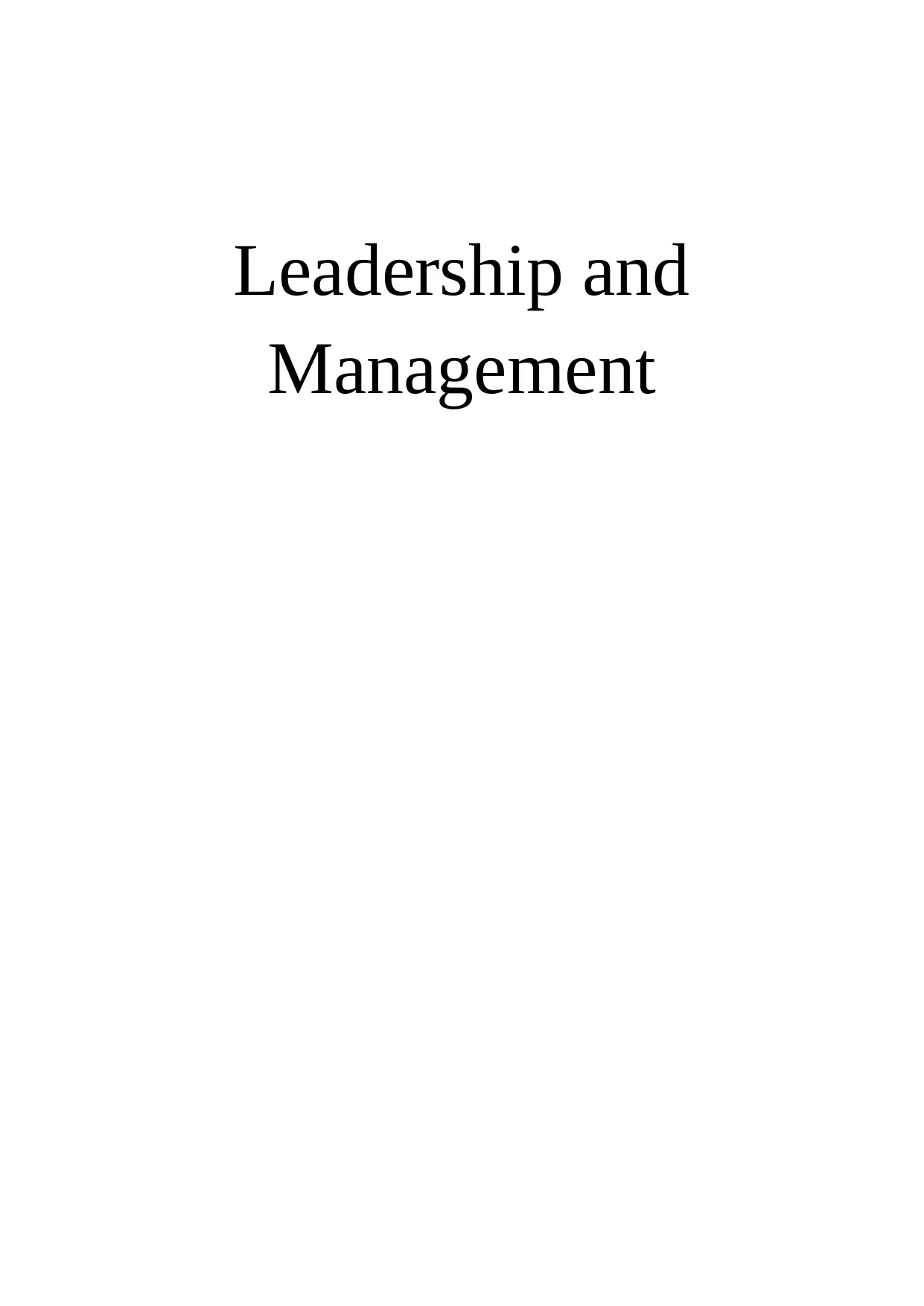
Leadership and
Management
Management
Secure Best Marks with AI Grader
Need help grading? Try our AI Grader for instant feedback on your assignments.
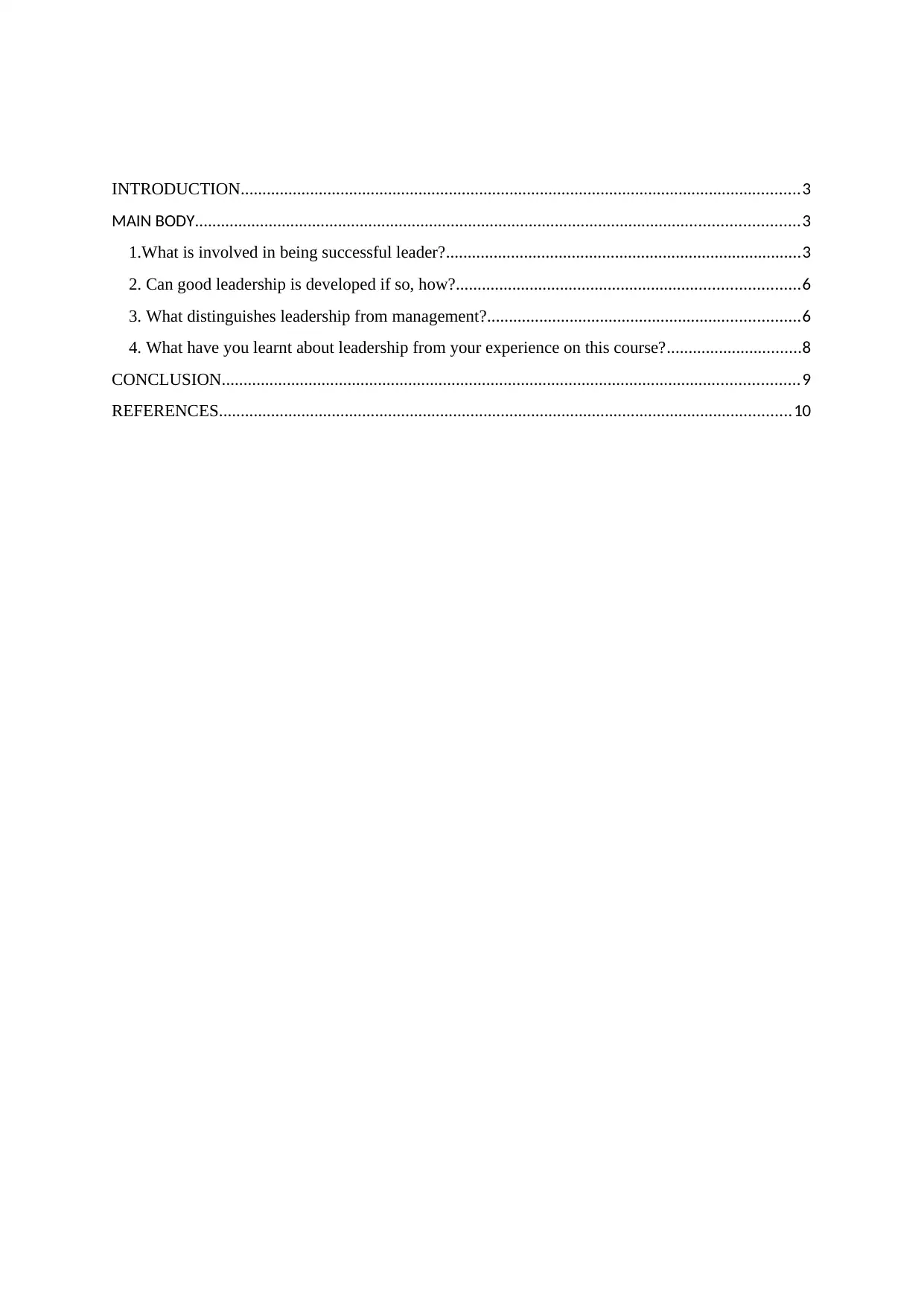
INTRODUCTION.................................................................................................................................3
MAIN BODY...........................................................................................................................................3
1.What is involved in being successful leader?..................................................................................3
2. Can good leadership is developed if so, how?...............................................................................6
3. What distinguishes leadership from management?........................................................................6
4. What have you learnt about leadership from your experience on this course?...............................8
CONCLUSION.....................................................................................................................................9
REFERENCES....................................................................................................................................10
MAIN BODY...........................................................................................................................................3
1.What is involved in being successful leader?..................................................................................3
2. Can good leadership is developed if so, how?...............................................................................6
3. What distinguishes leadership from management?........................................................................6
4. What have you learnt about leadership from your experience on this course?...............................8
CONCLUSION.....................................................................................................................................9
REFERENCES....................................................................................................................................10
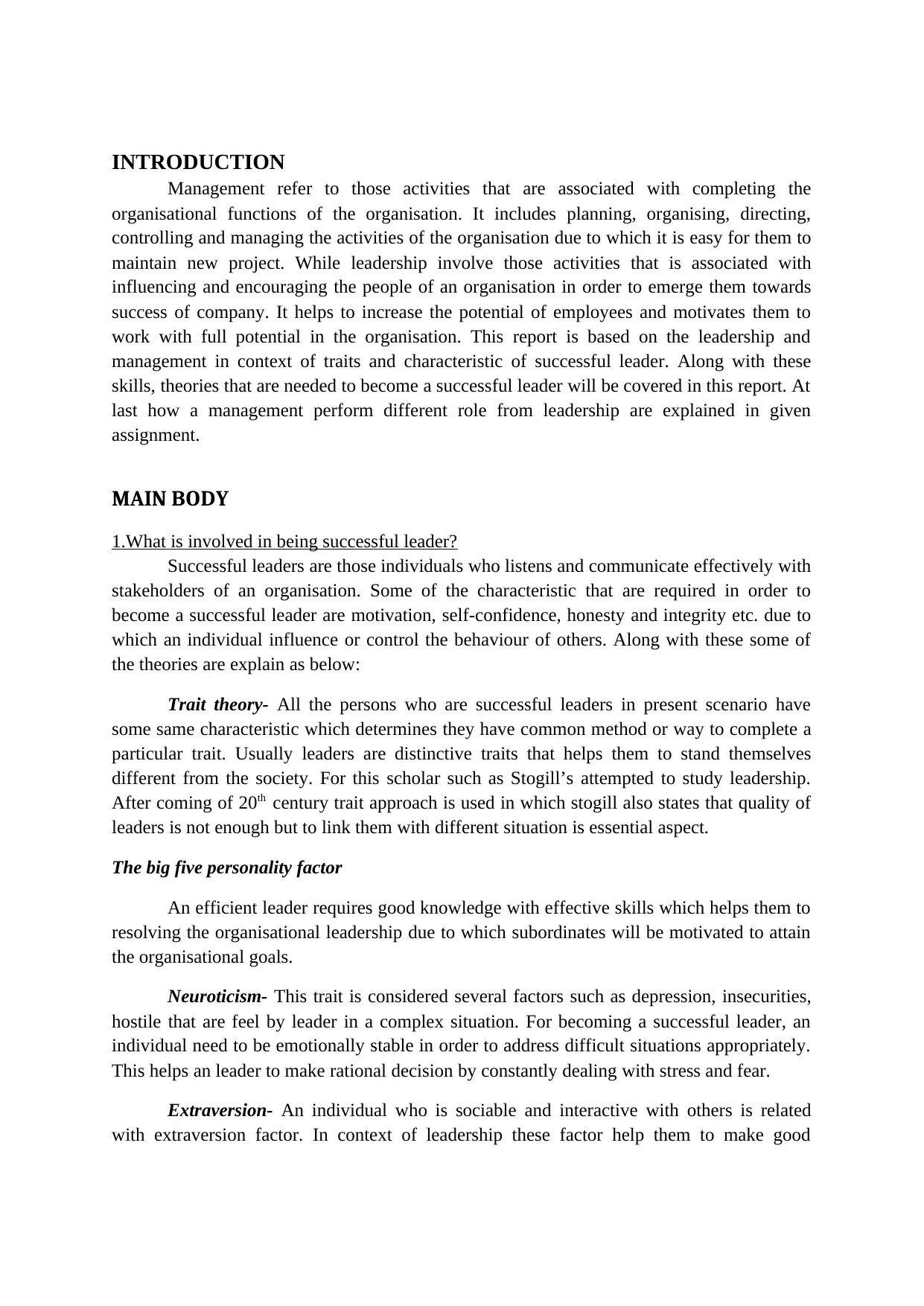
INTRODUCTION
Management refer to those activities that are associated with completing the
organisational functions of the organisation. It includes planning, organising, directing,
controlling and managing the activities of the organisation due to which it is easy for them to
maintain new project. While leadership involve those activities that is associated with
influencing and encouraging the people of an organisation in order to emerge them towards
success of company. It helps to increase the potential of employees and motivates them to
work with full potential in the organisation. This report is based on the leadership and
management in context of traits and characteristic of successful leader. Along with these
skills, theories that are needed to become a successful leader will be covered in this report. At
last how a management perform different role from leadership are explained in given
assignment.
MAIN BODY
1.What is involved in being successful leader?
Successful leaders are those individuals who listens and communicate effectively with
stakeholders of an organisation. Some of the characteristic that are required in order to
become a successful leader are motivation, self-confidence, honesty and integrity etc. due to
which an individual influence or control the behaviour of others. Along with these some of
the theories are explain as below:
Trait theory- All the persons who are successful leaders in present scenario have
some same characteristic which determines they have common method or way to complete a
particular trait. Usually leaders are distinctive traits that helps them to stand themselves
different from the society. For this scholar such as Stogill’s attempted to study leadership.
After coming of 20th century trait approach is used in which stogill also states that quality of
leaders is not enough but to link them with different situation is essential aspect.
The big five personality factor
An efficient leader requires good knowledge with effective skills which helps them to
resolving the organisational leadership due to which subordinates will be motivated to attain
the organisational goals.
Neuroticism- This trait is considered several factors such as depression, insecurities,
hostile that are feel by leader in a complex situation. For becoming a successful leader, an
individual need to be emotionally stable in order to address difficult situations appropriately.
This helps an leader to make rational decision by constantly dealing with stress and fear.
Extraversion- An individual who is sociable and interactive with others is related
with extraversion factor. In context of leadership these factor help them to make good
Management refer to those activities that are associated with completing the
organisational functions of the organisation. It includes planning, organising, directing,
controlling and managing the activities of the organisation due to which it is easy for them to
maintain new project. While leadership involve those activities that is associated with
influencing and encouraging the people of an organisation in order to emerge them towards
success of company. It helps to increase the potential of employees and motivates them to
work with full potential in the organisation. This report is based on the leadership and
management in context of traits and characteristic of successful leader. Along with these
skills, theories that are needed to become a successful leader will be covered in this report. At
last how a management perform different role from leadership are explained in given
assignment.
MAIN BODY
1.What is involved in being successful leader?
Successful leaders are those individuals who listens and communicate effectively with
stakeholders of an organisation. Some of the characteristic that are required in order to
become a successful leader are motivation, self-confidence, honesty and integrity etc. due to
which an individual influence or control the behaviour of others. Along with these some of
the theories are explain as below:
Trait theory- All the persons who are successful leaders in present scenario have
some same characteristic which determines they have common method or way to complete a
particular trait. Usually leaders are distinctive traits that helps them to stand themselves
different from the society. For this scholar such as Stogill’s attempted to study leadership.
After coming of 20th century trait approach is used in which stogill also states that quality of
leaders is not enough but to link them with different situation is essential aspect.
The big five personality factor
An efficient leader requires good knowledge with effective skills which helps them to
resolving the organisational leadership due to which subordinates will be motivated to attain
the organisational goals.
Neuroticism- This trait is considered several factors such as depression, insecurities,
hostile that are feel by leader in a complex situation. For becoming a successful leader, an
individual need to be emotionally stable in order to address difficult situations appropriately.
This helps an leader to make rational decision by constantly dealing with stress and fear.
Extraversion- An individual who is sociable and interactive with others is related
with extraversion factor. In context of leadership these factor help them to make good
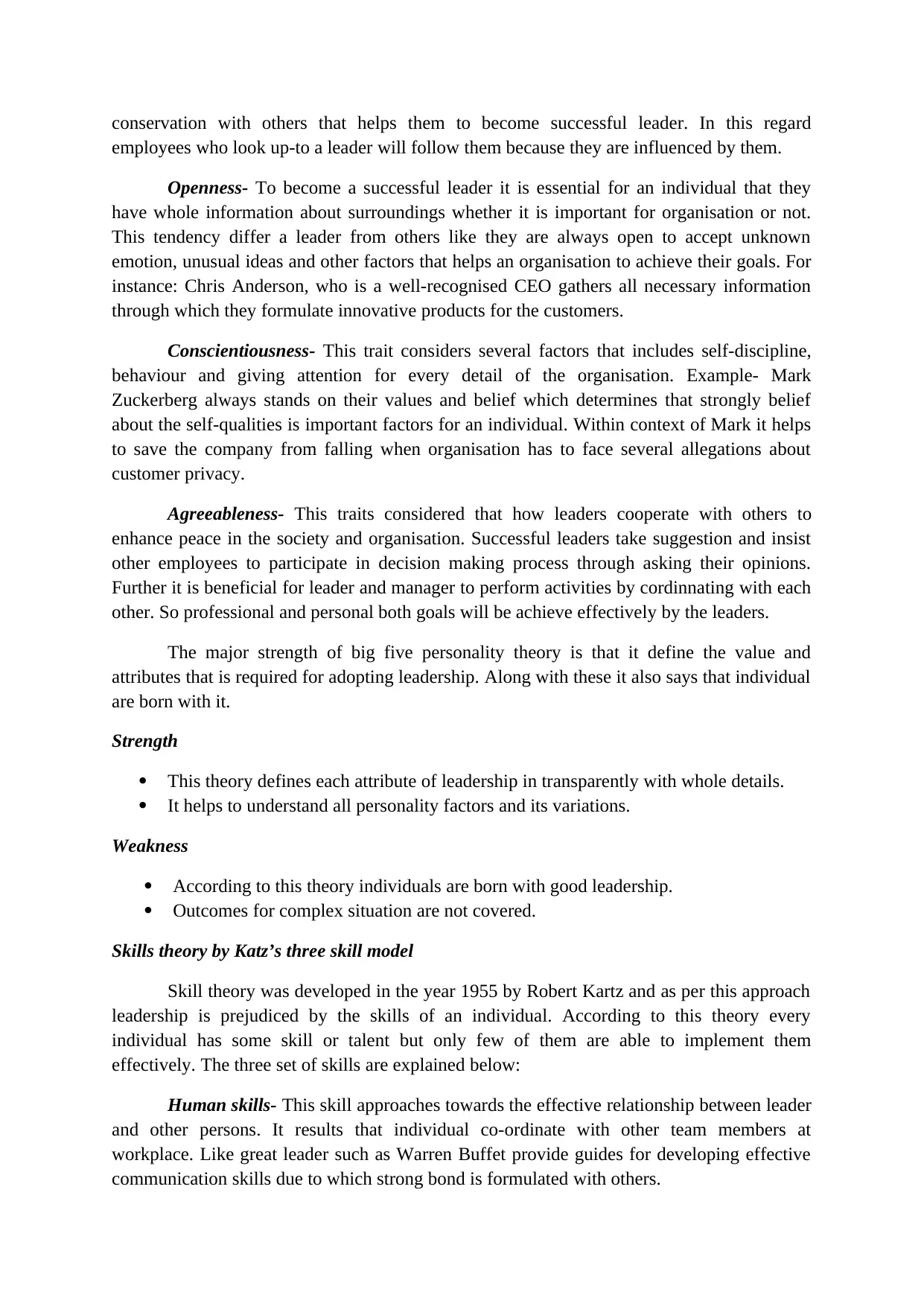
conservation with others that helps them to become successful leader. In this regard
employees who look up-to a leader will follow them because they are influenced by them.
Openness- To become a successful leader it is essential for an individual that they
have whole information about surroundings whether it is important for organisation or not.
This tendency differ a leader from others like they are always open to accept unknown
emotion, unusual ideas and other factors that helps an organisation to achieve their goals. For
instance: Chris Anderson, who is a well-recognised CEO gathers all necessary information
through which they formulate innovative products for the customers.
Conscientiousness- This trait considers several factors that includes self-discipline,
behaviour and giving attention for every detail of the organisation. Example- Mark
Zuckerberg always stands on their values and belief which determines that strongly belief
about the self-qualities is important factors for an individual. Within context of Mark it helps
to save the company from falling when organisation has to face several allegations about
customer privacy.
Agreeableness- This traits considered that how leaders cooperate with others to
enhance peace in the society and organisation. Successful leaders take suggestion and insist
other employees to participate in decision making process through asking their opinions.
Further it is beneficial for leader and manager to perform activities by cordinnating with each
other. So professional and personal both goals will be achieve effectively by the leaders.
The major strength of big five personality theory is that it define the value and
attributes that is required for adopting leadership. Along with these it also says that individual
are born with it.
Strength
This theory defines each attribute of leadership in transparently with whole details.
It helps to understand all personality factors and its variations.
Weakness
According to this theory individuals are born with good leadership.
Outcomes for complex situation are not covered.
Skills theory by Katz’s three skill model
Skill theory was developed in the year 1955 by Robert Kartz and as per this approach
leadership is prejudiced by the skills of an individual. According to this theory every
individual has some skill or talent but only few of them are able to implement them
effectively. The three set of skills are explained below:
Human skills- This skill approaches towards the effective relationship between leader
and other persons. It results that individual co-ordinate with other team members at
workplace. Like great leader such as Warren Buffet provide guides for developing effective
communication skills due to which strong bond is formulated with others.
employees who look up-to a leader will follow them because they are influenced by them.
Openness- To become a successful leader it is essential for an individual that they
have whole information about surroundings whether it is important for organisation or not.
This tendency differ a leader from others like they are always open to accept unknown
emotion, unusual ideas and other factors that helps an organisation to achieve their goals. For
instance: Chris Anderson, who is a well-recognised CEO gathers all necessary information
through which they formulate innovative products for the customers.
Conscientiousness- This trait considers several factors that includes self-discipline,
behaviour and giving attention for every detail of the organisation. Example- Mark
Zuckerberg always stands on their values and belief which determines that strongly belief
about the self-qualities is important factors for an individual. Within context of Mark it helps
to save the company from falling when organisation has to face several allegations about
customer privacy.
Agreeableness- This traits considered that how leaders cooperate with others to
enhance peace in the society and organisation. Successful leaders take suggestion and insist
other employees to participate in decision making process through asking their opinions.
Further it is beneficial for leader and manager to perform activities by cordinnating with each
other. So professional and personal both goals will be achieve effectively by the leaders.
The major strength of big five personality theory is that it define the value and
attributes that is required for adopting leadership. Along with these it also says that individual
are born with it.
Strength
This theory defines each attribute of leadership in transparently with whole details.
It helps to understand all personality factors and its variations.
Weakness
According to this theory individuals are born with good leadership.
Outcomes for complex situation are not covered.
Skills theory by Katz’s three skill model
Skill theory was developed in the year 1955 by Robert Kartz and as per this approach
leadership is prejudiced by the skills of an individual. According to this theory every
individual has some skill or talent but only few of them are able to implement them
effectively. The three set of skills are explained below:
Human skills- This skill approaches towards the effective relationship between leader
and other persons. It results that individual co-ordinate with other team members at
workplace. Like great leader such as Warren Buffet provide guides for developing effective
communication skills due to which strong bond is formulated with others.
Secure Best Marks with AI Grader
Need help grading? Try our AI Grader for instant feedback on your assignments.
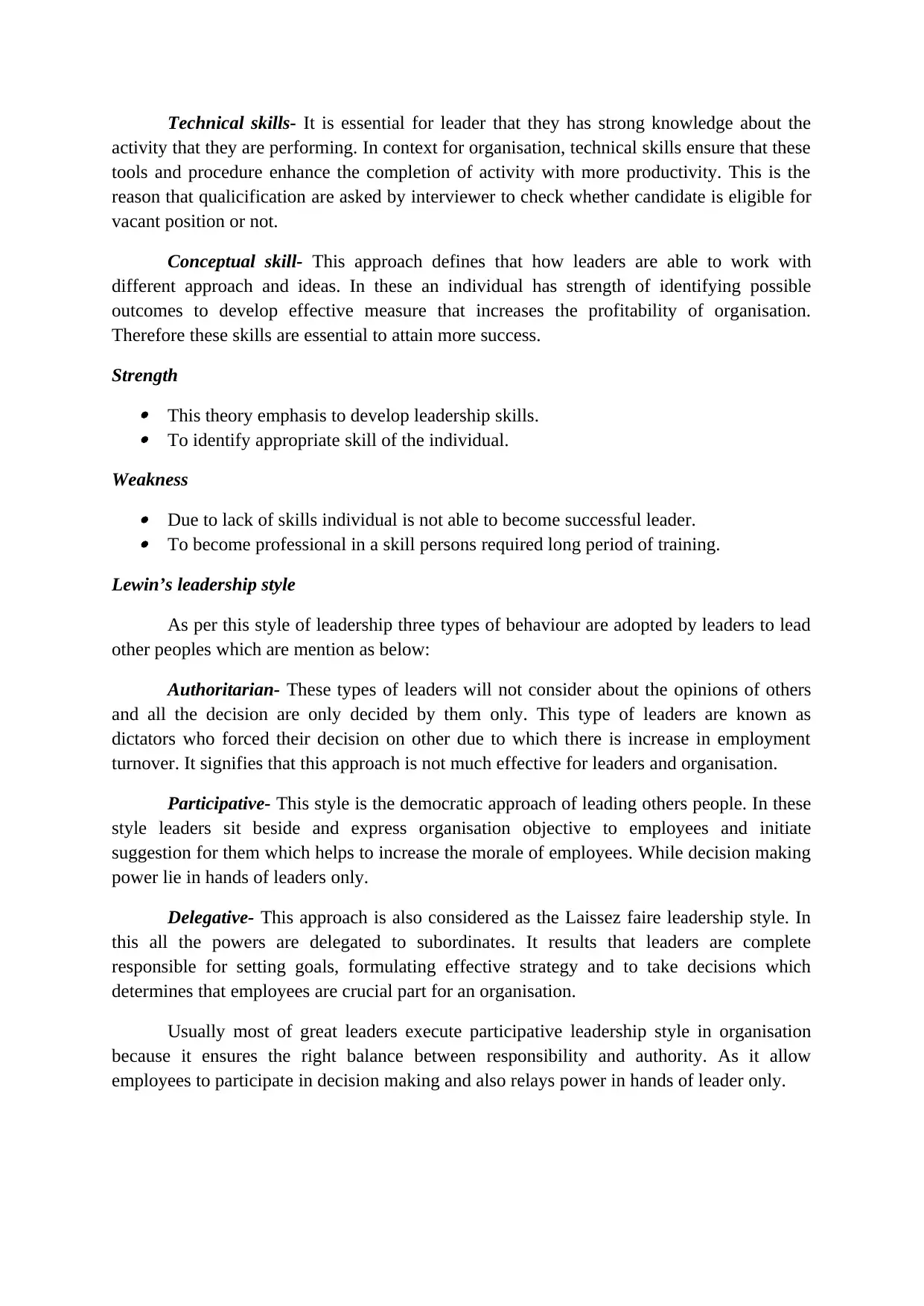
Technical skills- It is essential for leader that they has strong knowledge about the
activity that they are performing. In context for organisation, technical skills ensure that these
tools and procedure enhance the completion of activity with more productivity. This is the
reason that qualicification are asked by interviewer to check whether candidate is eligible for
vacant position or not.
Conceptual skill- This approach defines that how leaders are able to work with
different approach and ideas. In these an individual has strength of identifying possible
outcomes to develop effective measure that increases the profitability of organisation.
Therefore these skills are essential to attain more success.
Strength This theory emphasis to develop leadership skills.
To identify appropriate skill of the individual.
Weakness Due to lack of skills individual is not able to become successful leader.
To become professional in a skill persons required long period of training.
Lewin’s leadership style
As per this style of leadership three types of behaviour are adopted by leaders to lead
other peoples which are mention as below:
Authoritarian- These types of leaders will not consider about the opinions of others
and all the decision are only decided by them only. This type of leaders are known as
dictators who forced their decision on other due to which there is increase in employment
turnover. It signifies that this approach is not much effective for leaders and organisation.
Participative- This style is the democratic approach of leading others people. In these
style leaders sit beside and express organisation objective to employees and initiate
suggestion for them which helps to increase the morale of employees. While decision making
power lie in hands of leaders only.
Delegative- This approach is also considered as the Laissez faire leadership style. In
this all the powers are delegated to subordinates. It results that leaders are complete
responsible for setting goals, formulating effective strategy and to take decisions which
determines that employees are crucial part for an organisation.
Usually most of great leaders execute participative leadership style in organisation
because it ensures the right balance between responsibility and authority. As it allow
employees to participate in decision making and also relays power in hands of leader only.
activity that they are performing. In context for organisation, technical skills ensure that these
tools and procedure enhance the completion of activity with more productivity. This is the
reason that qualicification are asked by interviewer to check whether candidate is eligible for
vacant position or not.
Conceptual skill- This approach defines that how leaders are able to work with
different approach and ideas. In these an individual has strength of identifying possible
outcomes to develop effective measure that increases the profitability of organisation.
Therefore these skills are essential to attain more success.
Strength This theory emphasis to develop leadership skills.
To identify appropriate skill of the individual.
Weakness Due to lack of skills individual is not able to become successful leader.
To become professional in a skill persons required long period of training.
Lewin’s leadership style
As per this style of leadership three types of behaviour are adopted by leaders to lead
other peoples which are mention as below:
Authoritarian- These types of leaders will not consider about the opinions of others
and all the decision are only decided by them only. This type of leaders are known as
dictators who forced their decision on other due to which there is increase in employment
turnover. It signifies that this approach is not much effective for leaders and organisation.
Participative- This style is the democratic approach of leading others people. In these
style leaders sit beside and express organisation objective to employees and initiate
suggestion for them which helps to increase the morale of employees. While decision making
power lie in hands of leaders only.
Delegative- This approach is also considered as the Laissez faire leadership style. In
this all the powers are delegated to subordinates. It results that leaders are complete
responsible for setting goals, formulating effective strategy and to take decisions which
determines that employees are crucial part for an organisation.
Usually most of great leaders execute participative leadership style in organisation
because it ensures the right balance between responsibility and authority. As it allow
employees to participate in decision making and also relays power in hands of leader only.
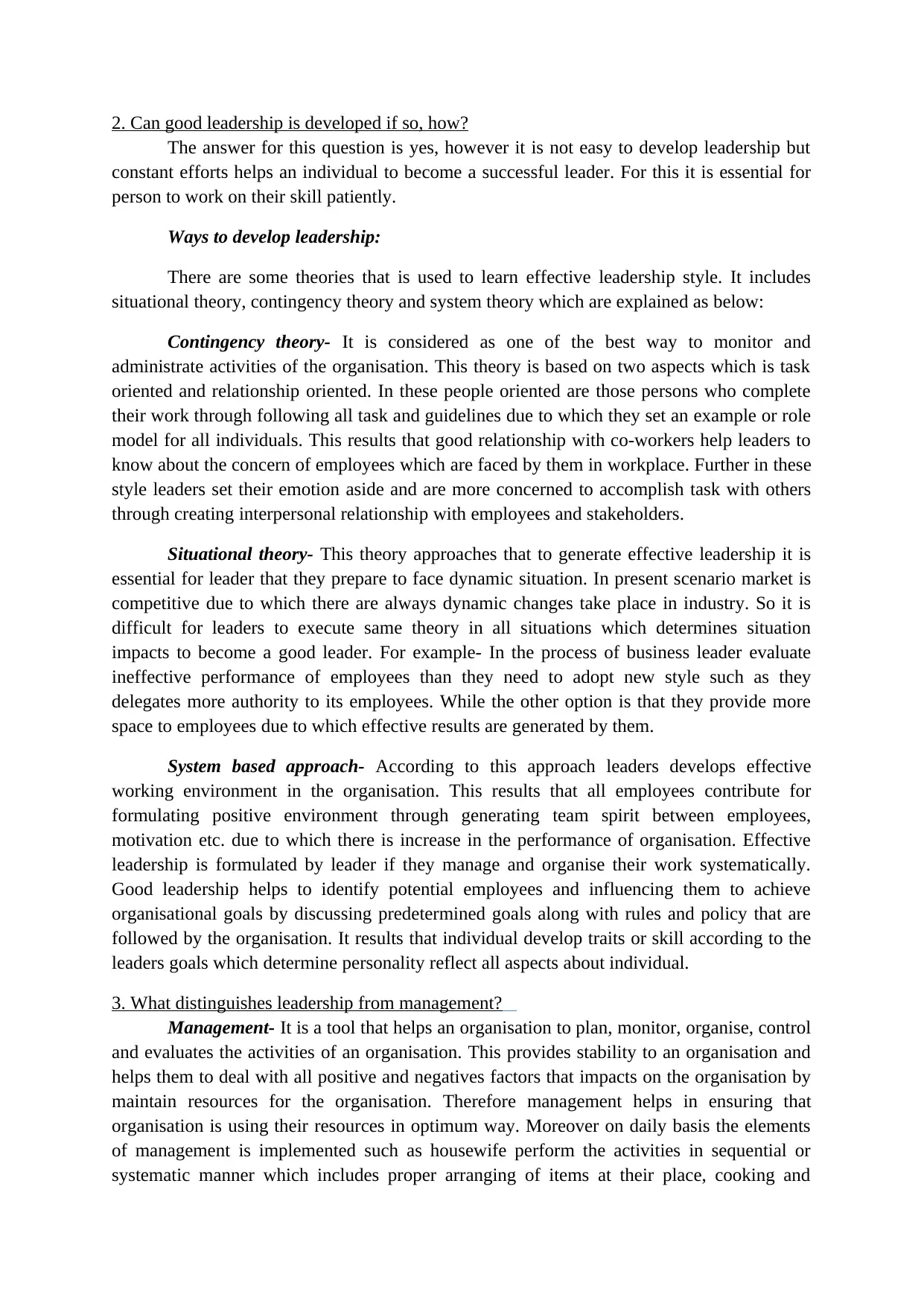
2. Can good leadership is developed if so, how?
The answer for this question is yes, however it is not easy to develop leadership but
constant efforts helps an individual to become a successful leader. For this it is essential for
person to work on their skill patiently.
Ways to develop leadership:
There are some theories that is used to learn effective leadership style. It includes
situational theory, contingency theory and system theory which are explained as below:
Contingency theory- It is considered as one of the best way to monitor and
administrate activities of the organisation. This theory is based on two aspects which is task
oriented and relationship oriented. In these people oriented are those persons who complete
their work through following all task and guidelines due to which they set an example or role
model for all individuals. This results that good relationship with co-workers help leaders to
know about the concern of employees which are faced by them in workplace. Further in these
style leaders set their emotion aside and are more concerned to accomplish task with others
through creating interpersonal relationship with employees and stakeholders.
Situational theory- This theory approaches that to generate effective leadership it is
essential for leader that they prepare to face dynamic situation. In present scenario market is
competitive due to which there are always dynamic changes take place in industry. So it is
difficult for leaders to execute same theory in all situations which determines situation
impacts to become a good leader. For example- In the process of business leader evaluate
ineffective performance of employees than they need to adopt new style such as they
delegates more authority to its employees. While the other option is that they provide more
space to employees due to which effective results are generated by them.
System based approach- According to this approach leaders develops effective
working environment in the organisation. This results that all employees contribute for
formulating positive environment through generating team spirit between employees,
motivation etc. due to which there is increase in the performance of organisation. Effective
leadership is formulated by leader if they manage and organise their work systematically.
Good leadership helps to identify potential employees and influencing them to achieve
organisational goals by discussing predetermined goals along with rules and policy that are
followed by the organisation. It results that individual develop traits or skill according to the
leaders goals which determine personality reflect all aspects about individual.
3. What distinguishes leadership from management?
Management- It is a tool that helps an organisation to plan, monitor, organise, control
and evaluates the activities of an organisation. This provides stability to an organisation and
helps them to deal with all positive and negatives factors that impacts on the organisation by
maintain resources for the organisation. Therefore management helps in ensuring that
organisation is using their resources in optimum way. Moreover on daily basis the elements
of management is implemented such as housewife perform the activities in sequential or
systematic manner which includes proper arranging of items at their place, cooking and
The answer for this question is yes, however it is not easy to develop leadership but
constant efforts helps an individual to become a successful leader. For this it is essential for
person to work on their skill patiently.
Ways to develop leadership:
There are some theories that is used to learn effective leadership style. It includes
situational theory, contingency theory and system theory which are explained as below:
Contingency theory- It is considered as one of the best way to monitor and
administrate activities of the organisation. This theory is based on two aspects which is task
oriented and relationship oriented. In these people oriented are those persons who complete
their work through following all task and guidelines due to which they set an example or role
model for all individuals. This results that good relationship with co-workers help leaders to
know about the concern of employees which are faced by them in workplace. Further in these
style leaders set their emotion aside and are more concerned to accomplish task with others
through creating interpersonal relationship with employees and stakeholders.
Situational theory- This theory approaches that to generate effective leadership it is
essential for leader that they prepare to face dynamic situation. In present scenario market is
competitive due to which there are always dynamic changes take place in industry. So it is
difficult for leaders to execute same theory in all situations which determines situation
impacts to become a good leader. For example- In the process of business leader evaluate
ineffective performance of employees than they need to adopt new style such as they
delegates more authority to its employees. While the other option is that they provide more
space to employees due to which effective results are generated by them.
System based approach- According to this approach leaders develops effective
working environment in the organisation. This results that all employees contribute for
formulating positive environment through generating team spirit between employees,
motivation etc. due to which there is increase in the performance of organisation. Effective
leadership is formulated by leader if they manage and organise their work systematically.
Good leadership helps to identify potential employees and influencing them to achieve
organisational goals by discussing predetermined goals along with rules and policy that are
followed by the organisation. It results that individual develop traits or skill according to the
leaders goals which determine personality reflect all aspects about individual.
3. What distinguishes leadership from management?
Management- It is a tool that helps an organisation to plan, monitor, organise, control
and evaluates the activities of an organisation. This provides stability to an organisation and
helps them to deal with all positive and negatives factors that impacts on the organisation by
maintain resources for the organisation. Therefore management helps in ensuring that
organisation is using their resources in optimum way. Moreover on daily basis the elements
of management is implemented such as housewife perform the activities in sequential or
systematic manner which includes proper arranging of items at their place, cooking and
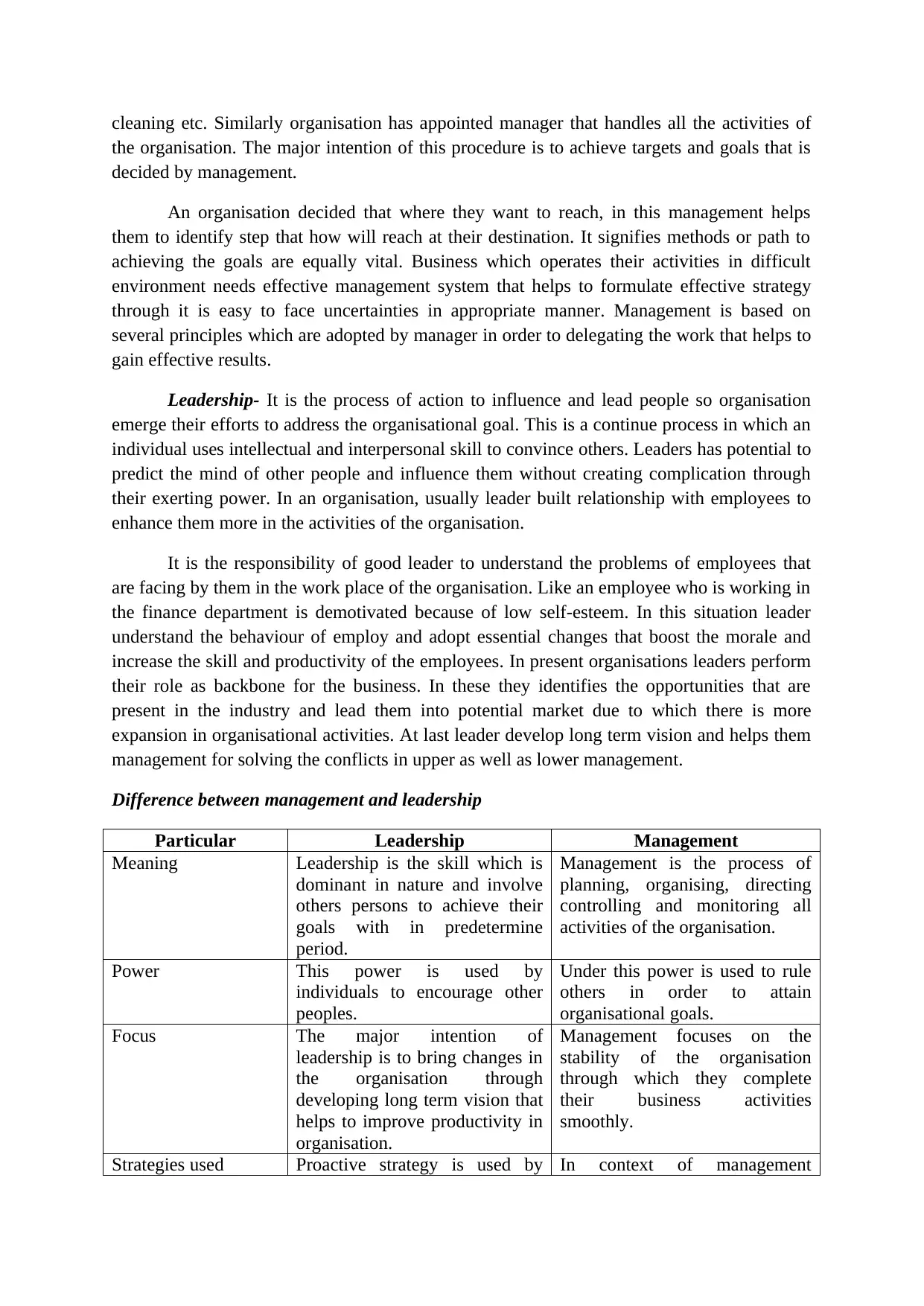
cleaning etc. Similarly organisation has appointed manager that handles all the activities of
the organisation. The major intention of this procedure is to achieve targets and goals that is
decided by management.
An organisation decided that where they want to reach, in this management helps
them to identify step that how will reach at their destination. It signifies methods or path to
achieving the goals are equally vital. Business which operates their activities in difficult
environment needs effective management system that helps to formulate effective strategy
through it is easy to face uncertainties in appropriate manner. Management is based on
several principles which are adopted by manager in order to delegating the work that helps to
gain effective results.
Leadership- It is the process of action to influence and lead people so organisation
emerge their efforts to address the organisational goal. This is a continue process in which an
individual uses intellectual and interpersonal skill to convince others. Leaders has potential to
predict the mind of other people and influence them without creating complication through
their exerting power. In an organisation, usually leader built relationship with employees to
enhance them more in the activities of the organisation.
It is the responsibility of good leader to understand the problems of employees that
are facing by them in the work place of the organisation. Like an employee who is working in
the finance department is demotivated because of low self-esteem. In this situation leader
understand the behaviour of employ and adopt essential changes that boost the morale and
increase the skill and productivity of the employees. In present organisations leaders perform
their role as backbone for the business. In these they identifies the opportunities that are
present in the industry and lead them into potential market due to which there is more
expansion in organisational activities. At last leader develop long term vision and helps them
management for solving the conflicts in upper as well as lower management.
Difference between management and leadership
Particular Leadership Management
Meaning Leadership is the skill which is
dominant in nature and involve
others persons to achieve their
goals with in predetermine
period.
Management is the process of
planning, organising, directing
controlling and monitoring all
activities of the organisation.
Power This power is used by
individuals to encourage other
peoples.
Under this power is used to rule
others in order to attain
organisational goals.
Focus The major intention of
leadership is to bring changes in
the organisation through
developing long term vision that
helps to improve productivity in
organisation.
Management focuses on the
stability of the organisation
through which they complete
their business activities
smoothly.
Strategies used Proactive strategy is used by In context of management
the organisation. The major intention of this procedure is to achieve targets and goals that is
decided by management.
An organisation decided that where they want to reach, in this management helps
them to identify step that how will reach at their destination. It signifies methods or path to
achieving the goals are equally vital. Business which operates their activities in difficult
environment needs effective management system that helps to formulate effective strategy
through it is easy to face uncertainties in appropriate manner. Management is based on
several principles which are adopted by manager in order to delegating the work that helps to
gain effective results.
Leadership- It is the process of action to influence and lead people so organisation
emerge their efforts to address the organisational goal. This is a continue process in which an
individual uses intellectual and interpersonal skill to convince others. Leaders has potential to
predict the mind of other people and influence them without creating complication through
their exerting power. In an organisation, usually leader built relationship with employees to
enhance them more in the activities of the organisation.
It is the responsibility of good leader to understand the problems of employees that
are facing by them in the work place of the organisation. Like an employee who is working in
the finance department is demotivated because of low self-esteem. In this situation leader
understand the behaviour of employ and adopt essential changes that boost the morale and
increase the skill and productivity of the employees. In present organisations leaders perform
their role as backbone for the business. In these they identifies the opportunities that are
present in the industry and lead them into potential market due to which there is more
expansion in organisational activities. At last leader develop long term vision and helps them
management for solving the conflicts in upper as well as lower management.
Difference between management and leadership
Particular Leadership Management
Meaning Leadership is the skill which is
dominant in nature and involve
others persons to achieve their
goals with in predetermine
period.
Management is the process of
planning, organising, directing
controlling and monitoring all
activities of the organisation.
Power This power is used by
individuals to encourage other
peoples.
Under this power is used to rule
others in order to attain
organisational goals.
Focus The major intention of
leadership is to bring changes in
the organisation through
developing long term vision that
helps to improve productivity in
organisation.
Management focuses on the
stability of the organisation
through which they complete
their business activities
smoothly.
Strategies used Proactive strategy is used by In context of management
Paraphrase This Document
Need a fresh take? Get an instant paraphrase of this document with our AI Paraphraser
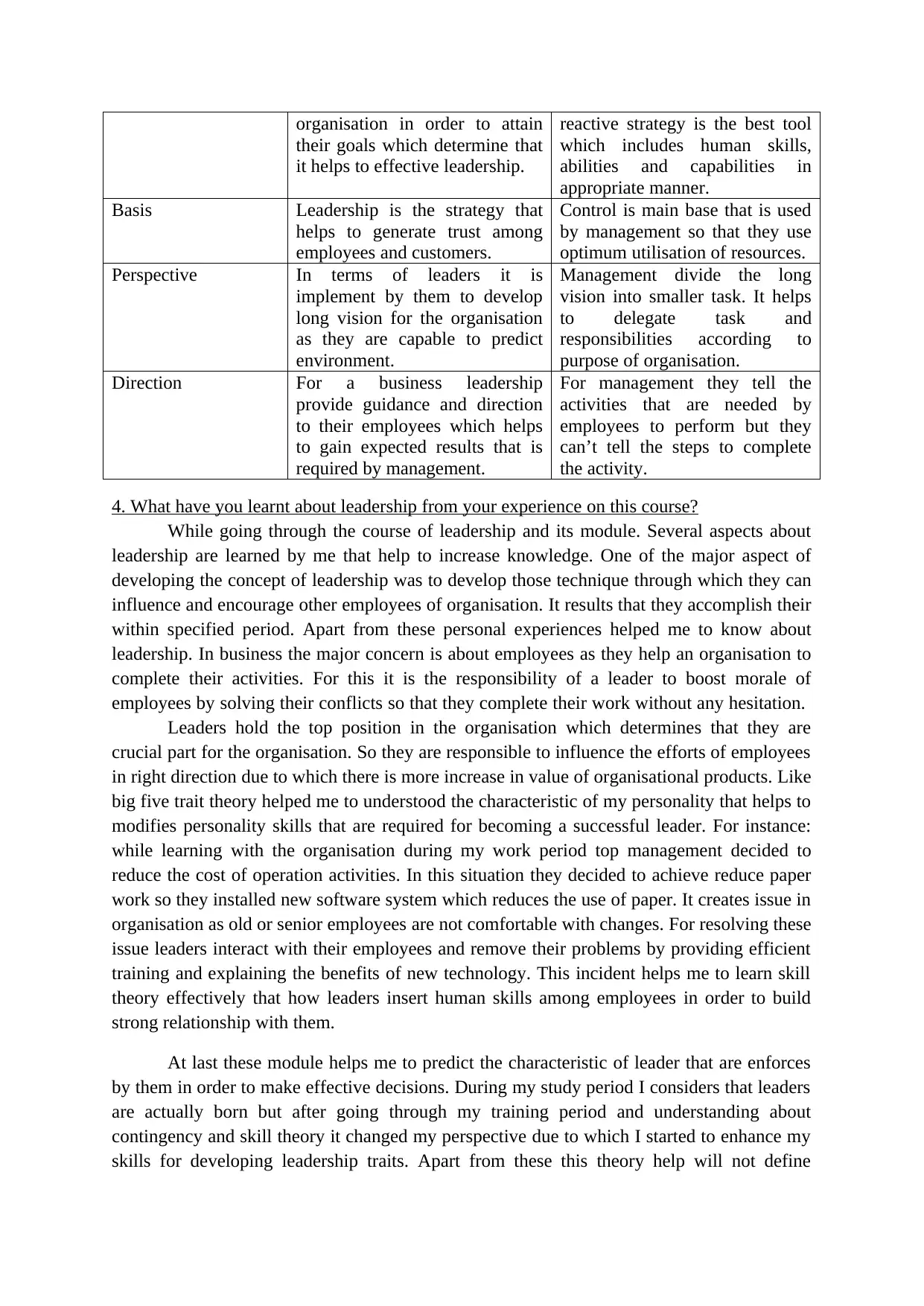
organisation in order to attain
their goals which determine that
it helps to effective leadership.
reactive strategy is the best tool
which includes human skills,
abilities and capabilities in
appropriate manner.
Basis Leadership is the strategy that
helps to generate trust among
employees and customers.
Control is main base that is used
by management so that they use
optimum utilisation of resources.
Perspective In terms of leaders it is
implement by them to develop
long vision for the organisation
as they are capable to predict
environment.
Management divide the long
vision into smaller task. It helps
to delegate task and
responsibilities according to
purpose of organisation.
Direction For a business leadership
provide guidance and direction
to their employees which helps
to gain expected results that is
required by management.
For management they tell the
activities that are needed by
employees to perform but they
can’t tell the steps to complete
the activity.
4. What have you learnt about leadership from your experience on this course?
While going through the course of leadership and its module. Several aspects about
leadership are learned by me that help to increase knowledge. One of the major aspect of
developing the concept of leadership was to develop those technique through which they can
influence and encourage other employees of organisation. It results that they accomplish their
within specified period. Apart from these personal experiences helped me to know about
leadership. In business the major concern is about employees as they help an organisation to
complete their activities. For this it is the responsibility of a leader to boost morale of
employees by solving their conflicts so that they complete their work without any hesitation.
Leaders hold the top position in the organisation which determines that they are
crucial part for the organisation. So they are responsible to influence the efforts of employees
in right direction due to which there is more increase in value of organisational products. Like
big five trait theory helped me to understood the characteristic of my personality that helps to
modifies personality skills that are required for becoming a successful leader. For instance:
while learning with the organisation during my work period top management decided to
reduce the cost of operation activities. In this situation they decided to achieve reduce paper
work so they installed new software system which reduces the use of paper. It creates issue in
organisation as old or senior employees are not comfortable with changes. For resolving these
issue leaders interact with their employees and remove their problems by providing efficient
training and explaining the benefits of new technology. This incident helps me to learn skill
theory effectively that how leaders insert human skills among employees in order to build
strong relationship with them.
At last these module helps me to predict the characteristic of leader that are enforces
by them in order to make effective decisions. During my study period I considers that leaders
are actually born but after going through my training period and understanding about
contingency and skill theory it changed my perspective due to which I started to enhance my
skills for developing leadership traits. Apart from these this theory help will not define
their goals which determine that
it helps to effective leadership.
reactive strategy is the best tool
which includes human skills,
abilities and capabilities in
appropriate manner.
Basis Leadership is the strategy that
helps to generate trust among
employees and customers.
Control is main base that is used
by management so that they use
optimum utilisation of resources.
Perspective In terms of leaders it is
implement by them to develop
long vision for the organisation
as they are capable to predict
environment.
Management divide the long
vision into smaller task. It helps
to delegate task and
responsibilities according to
purpose of organisation.
Direction For a business leadership
provide guidance and direction
to their employees which helps
to gain expected results that is
required by management.
For management they tell the
activities that are needed by
employees to perform but they
can’t tell the steps to complete
the activity.
4. What have you learnt about leadership from your experience on this course?
While going through the course of leadership and its module. Several aspects about
leadership are learned by me that help to increase knowledge. One of the major aspect of
developing the concept of leadership was to develop those technique through which they can
influence and encourage other employees of organisation. It results that they accomplish their
within specified period. Apart from these personal experiences helped me to know about
leadership. In business the major concern is about employees as they help an organisation to
complete their activities. For this it is the responsibility of a leader to boost morale of
employees by solving their conflicts so that they complete their work without any hesitation.
Leaders hold the top position in the organisation which determines that they are
crucial part for the organisation. So they are responsible to influence the efforts of employees
in right direction due to which there is more increase in value of organisational products. Like
big five trait theory helped me to understood the characteristic of my personality that helps to
modifies personality skills that are required for becoming a successful leader. For instance:
while learning with the organisation during my work period top management decided to
reduce the cost of operation activities. In this situation they decided to achieve reduce paper
work so they installed new software system which reduces the use of paper. It creates issue in
organisation as old or senior employees are not comfortable with changes. For resolving these
issue leaders interact with their employees and remove their problems by providing efficient
training and explaining the benefits of new technology. This incident helps me to learn skill
theory effectively that how leaders insert human skills among employees in order to build
strong relationship with them.
At last these module helps me to predict the characteristic of leader that are enforces
by them in order to make effective decisions. During my study period I considers that leaders
are actually born but after going through my training period and understanding about
contingency and skill theory it changed my perspective due to which I started to enhance my
skills for developing leadership traits. Apart from these this theory help will not define
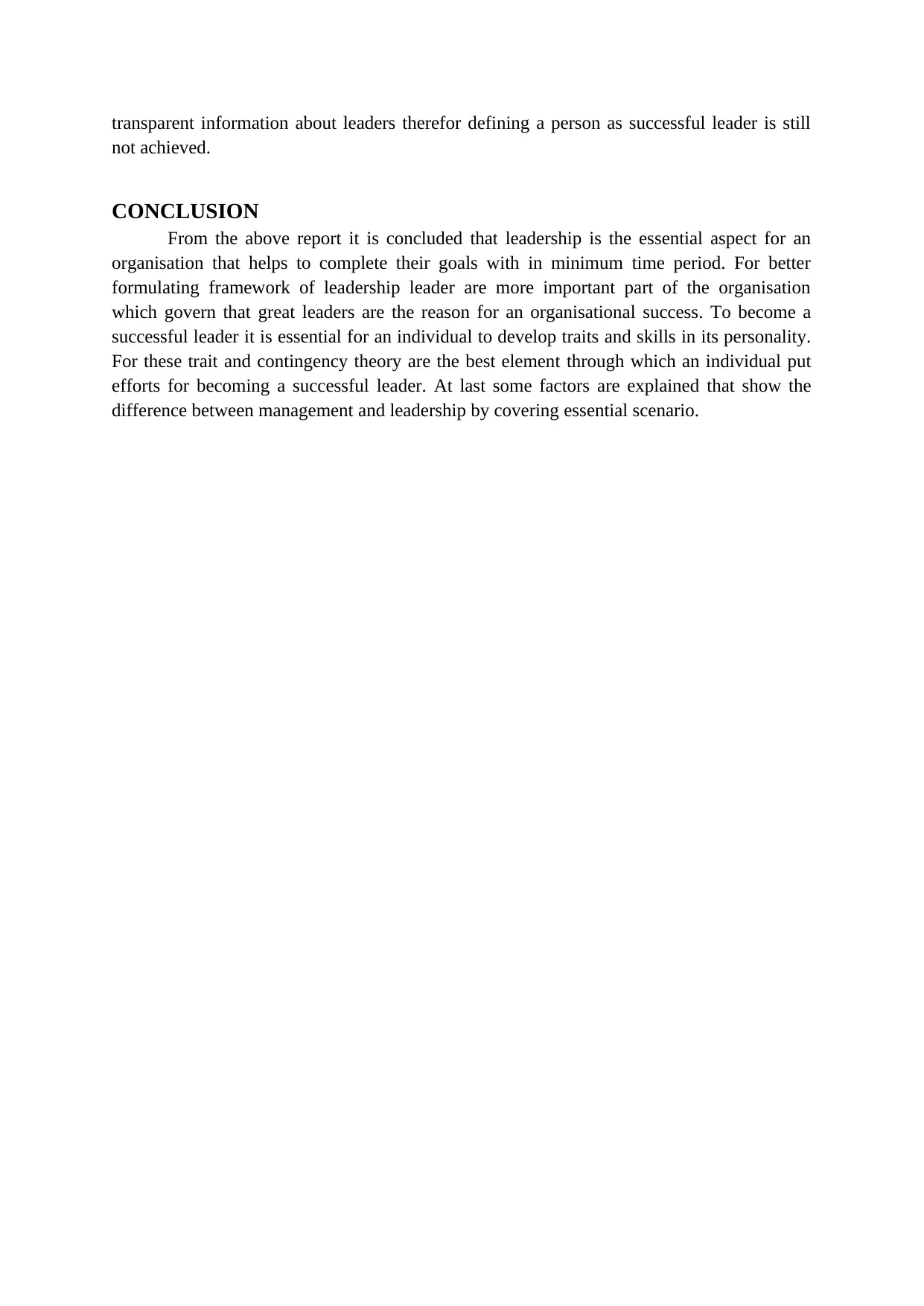
transparent information about leaders therefor defining a person as successful leader is still
not achieved.
CONCLUSION
From the above report it is concluded that leadership is the essential aspect for an
organisation that helps to complete their goals with in minimum time period. For better
formulating framework of leadership leader are more important part of the organisation
which govern that great leaders are the reason for an organisational success. To become a
successful leader it is essential for an individual to develop traits and skills in its personality.
For these trait and contingency theory are the best element through which an individual put
efforts for becoming a successful leader. At last some factors are explained that show the
difference between management and leadership by covering essential scenario.
not achieved.
CONCLUSION
From the above report it is concluded that leadership is the essential aspect for an
organisation that helps to complete their goals with in minimum time period. For better
formulating framework of leadership leader are more important part of the organisation
which govern that great leaders are the reason for an organisational success. To become a
successful leader it is essential for an individual to develop traits and skills in its personality.
For these trait and contingency theory are the best element through which an individual put
efforts for becoming a successful leader. At last some factors are explained that show the
difference between management and leadership by covering essential scenario.
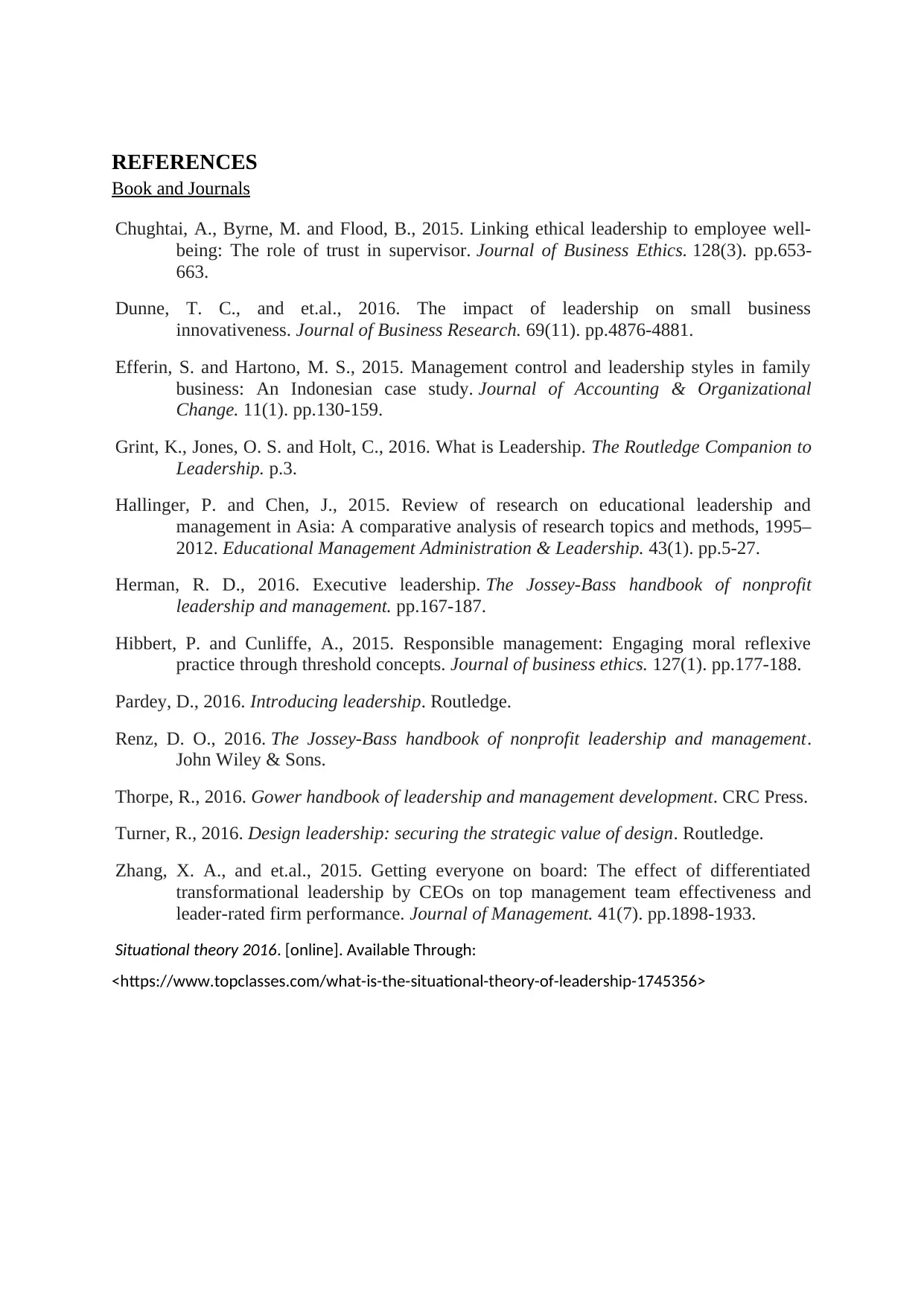
REFERENCES
Book and Journals
Chughtai, A., Byrne, M. and Flood, B., 2015. Linking ethical leadership to employee well-
being: The role of trust in supervisor. Journal of Business Ethics. 128(3). pp.653-
663.
Dunne, T. C., and et.al., 2016. The impact of leadership on small business
innovativeness. Journal of Business Research. 69(11). pp.4876-4881.
Efferin, S. and Hartono, M. S., 2015. Management control and leadership styles in family
business: An Indonesian case study. Journal of Accounting & Organizational
Change. 11(1). pp.130-159.
Grint, K., Jones, O. S. and Holt, C., 2016. What is Leadership. The Routledge Companion to
Leadership. p.3.
Hallinger, P. and Chen, J., 2015. Review of research on educational leadership and
management in Asia: A comparative analysis of research topics and methods, 1995–
2012. Educational Management Administration & Leadership. 43(1). pp.5-27.
Herman, R. D., 2016. Executive leadership. The Jossey‐Bass handbook of nonprofit
leadership and management. pp.167-187.
Hibbert, P. and Cunliffe, A., 2015. Responsible management: Engaging moral reflexive
practice through threshold concepts. Journal of business ethics. 127(1). pp.177-188.
Pardey, D., 2016. Introducing leadership. Routledge.
Renz, D. O., 2016. The Jossey-Bass handbook of nonprofit leadership and management.
John Wiley & Sons.
Thorpe, R., 2016. Gower handbook of leadership and management development. CRC Press.
Turner, R., 2016. Design leadership: securing the strategic value of design. Routledge.
Zhang, X. A., and et.al., 2015. Getting everyone on board: The effect of differentiated
transformational leadership by CEOs on top management team effectiveness and
leader-rated firm performance. Journal of Management. 41(7). pp.1898-1933.
Situational theory 2016. [online]. Available Through:
<https://www.topclasses.com/what-is-the-situational-theory-of-leadership-1745356>
Book and Journals
Chughtai, A., Byrne, M. and Flood, B., 2015. Linking ethical leadership to employee well-
being: The role of trust in supervisor. Journal of Business Ethics. 128(3). pp.653-
663.
Dunne, T. C., and et.al., 2016. The impact of leadership on small business
innovativeness. Journal of Business Research. 69(11). pp.4876-4881.
Efferin, S. and Hartono, M. S., 2015. Management control and leadership styles in family
business: An Indonesian case study. Journal of Accounting & Organizational
Change. 11(1). pp.130-159.
Grint, K., Jones, O. S. and Holt, C., 2016. What is Leadership. The Routledge Companion to
Leadership. p.3.
Hallinger, P. and Chen, J., 2015. Review of research on educational leadership and
management in Asia: A comparative analysis of research topics and methods, 1995–
2012. Educational Management Administration & Leadership. 43(1). pp.5-27.
Herman, R. D., 2016. Executive leadership. The Jossey‐Bass handbook of nonprofit
leadership and management. pp.167-187.
Hibbert, P. and Cunliffe, A., 2015. Responsible management: Engaging moral reflexive
practice through threshold concepts. Journal of business ethics. 127(1). pp.177-188.
Pardey, D., 2016. Introducing leadership. Routledge.
Renz, D. O., 2016. The Jossey-Bass handbook of nonprofit leadership and management.
John Wiley & Sons.
Thorpe, R., 2016. Gower handbook of leadership and management development. CRC Press.
Turner, R., 2016. Design leadership: securing the strategic value of design. Routledge.
Zhang, X. A., and et.al., 2015. Getting everyone on board: The effect of differentiated
transformational leadership by CEOs on top management team effectiveness and
leader-rated firm performance. Journal of Management. 41(7). pp.1898-1933.
Situational theory 2016. [online]. Available Through:
<https://www.topclasses.com/what-is-the-situational-theory-of-leadership-1745356>
Secure Best Marks with AI Grader
Need help grading? Try our AI Grader for instant feedback on your assignments.

1 out of 11
Related Documents
Your All-in-One AI-Powered Toolkit for Academic Success.
+13062052269
info@desklib.com
Available 24*7 on WhatsApp / Email
![[object Object]](/_next/static/media/star-bottom.7253800d.svg)
Unlock your academic potential
© 2024 | Zucol Services PVT LTD | All rights reserved.



